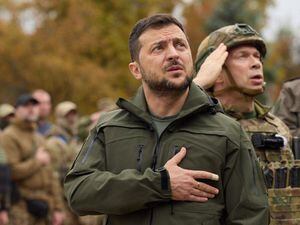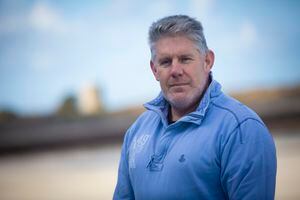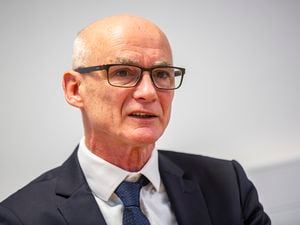OPINION: The beginning of the end of Ukraine war
Former soldier Lt Colonel Colin Vaudin explains why he thinks there may be a growing divide between what President Zelensky and the West see as an acceptable end to the war in Ukraine

WE ARE at the beginning of the end of the war in Ukraine – a war that Putin has lost.
Two weeks ago I made this assessment but posed the question of how long and how much suffering will be needed until Putin accepts this reality, or is either deposed or disposed of.
The strategic withdrawal of Russian Troops to the left bank of the Dnipro River is a pragmatic military decision pulling back to a far more defensible position, but equally it is also a reflection of the strategic failure of Putin’s invasion.

So as we, hopefully, move towards the end of this war, and while Putin has lost, what does winning look like to the West and Zelensky?
The challenge to the West and Ukraine is that beyond generic statements of supporting Ukraine and preventing Russian aggression there is no real definition of politically what we want to achieve. Is the policy outcome regime change in Russia? Or ensuring the survival of the Ukraine state, the physical defeat of the Russian army in the field, or restoration of Ukrainian territorial integrity? I should add that, if it is the latter, the territory before this latest war or does that mean the restoration of Ukrainian control over Crimea?
These are vastly different outcomes or definitions of success, and military doctrine tells us the strategy, the timescale and the resources to deliver it will also need to be significantly different.
Last week saw the US mid-term elections and the Republican Party may well win the House of Representatives and they have indicated that they will not write a blank cheque for Ukraine. Even President Biden is reported to have lost his temper in a call with the leader of Ukraine when he told Zelensky ‘he could show a little more gratitude’.
Our latest Prime Minister has not spoken meaningfully on this subject, but the Defence Secretary Ben Wallace held a meeting with US counterparts described by another UK defence minister as being about particularly sensitive and serious issues but what these are were not disclosed.
The final key player in this is Zelensky himself.
In the last two months he has become more emboldened by his force’s battlefield successes and vocal about recovering all Ukrainian territory including Crimea.
He even acknowledged that this would probably require the forced removal of almost 900,000 Russian citizens from Crimea and the other occupied areas and would mean a continuation of the war into late summer 2023 at the earliest.
While I have previously cautioned against appeasement and have condemned Putin’s illegal invasion of Ukraine, and believe that he, and many of his senior commanders and officials, should face an international court, that does not mean I support an endless war in pursuit of an unrealistic policy goal.
For the most part that is because I know the suffering it will bring to all sides, the economic pressures in the west and famine in parts of Africa. My assessment is that there may be a growing divide between how the West defines an acceptable policy goal in ending the war and Zelensky’s.
If the West feels Putin has been cowed, that his military capability has been sufficiently degraded that the wider threat to the Baltic states is mitigated, its calculation of the balance with the continued economic impact will change.
If Zelensky, buoyed by the success of recapturing Kherson, will not countenance a policy goal without the recovery of Crimea then there is a fundamentally political misalignment.
President Zelensky has been lionised during the war, has spoken to the UN, a joint sitting with the US and the UK.
He has shown incredible leadership and resilience, but he cannot alone define western strategy over the ending of the war.
I congratulate President Zelensky and his brave countrymen for forcing Russia into this position and recapturing Kherson – it is a great victory, but it doesn’t end the war. Putin cannot accept, without being deposed, the loss of Crimea which has been illegally Russian for eight years.
From a western perspective, and unless the Russian Army collapses, I judge that an acceptable definition of winning and accepting a negotiated peace will not include the return of Crimea to Ukraine.
Unless Zelensky can accept this, he may become the impediment to a peace that the rest of the West accepts. That bitter pill might be sweetened if it included membership of Nato and the EU, the two strategic objectives he has held since before the war.
This may well be a peace deal that Putin would accept – it will bring a much-needed peace to Europe and provide the security Ukraine needs into the future.





